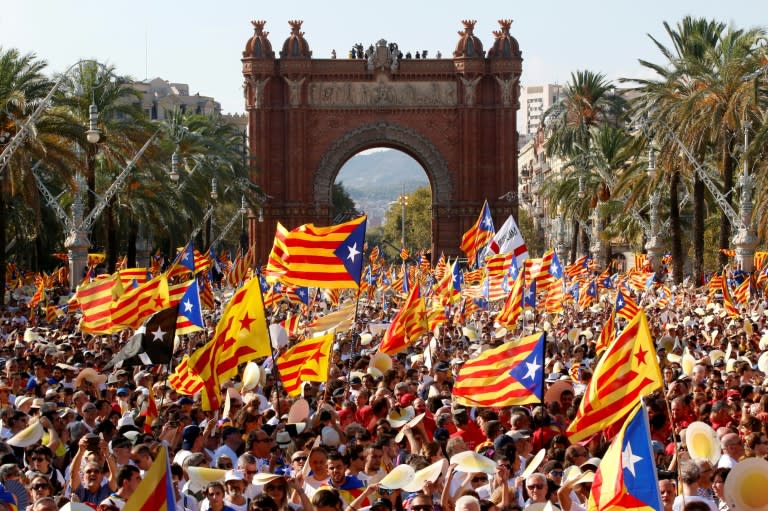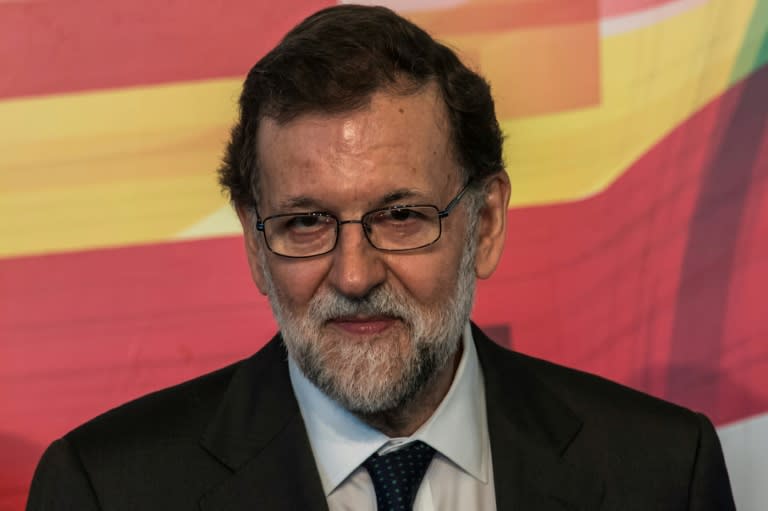Spain PM urges calm in face of 'authoritarian delusions' in Catalonia
Spain's prime minister called for calm Wednesday in the face of "authoritarian delusions" in Catalonia, as tensions between Madrid and separatists in the northeastern region surged over an independence drive. "To all Catalans, to all Spaniards, I want to tell you to maintain confidence in the future as authoritarian delusions... will never defeat the serenity and harmony of our democratic state," Mariano Rajoy told a gathering in Madrid. His comments came a day after the separatist coalition that governs Catalonia, a wealthy region of 7.5 million inhabitants with its own language and customs, unveiled a bill aimed at ensuring an independence referendum in defiance of Madrid. Coalition lawmakers said Catalonia would declare independence "immediately" if voters opt to separate from Spain in a referendum planned for October 1. If the "no" side wins, new regional elections will be called, they said. The bill aims to extract the region from Spain's legal system -- a step aimed at preventing the central authorities from throwing up any legal and practical challenges to organising the referendum. It will be submitted to a vote in the Catalan regional parliament, where separatists hold a majority, at the end of the summer. - 'Phase of great tension' - For years separatist politicians in the region have tried to win approval from Madrid to hold a vote similar to Scotland's 2014 independence referendum from Britain -- which was approved by London, though it resulted in a "no" vote. But Madrid has remained steadfast in its opposition to such a vote, considering it a threat to Spain's unity. The Constitutional Court has already quashed a resolution approved by Catalonia's parliament calling for the referendum to take place. It has also warned Catalonia's elected officials that they would face legal consequences if they took any steps towards holding such a vote. The court on Wednesday ruled that the funding set aside in Catalonia's 2017 budget for the referendum was unconstitutional. And while not mentioning Catalonia directly, Defence Minister Maria Dolores de Cospedal issued a thinly-veiled threat on Tuesday, noting the army's role was to defend democracy and the Constitution, and the "integrity and sovereignty of our country." Aside from the legal bans of the Constitutional Court, the central government has also threatened civil servants with sanctions if they help organise the referendum, and has warned companies against any involvement. Catalan vice president Oriol Junqueras vowed Wednesday that his government would "put out ballot boxes" on October 1. Rajoy will not be able to seize them, he added during an interview with AFP. "The Spanish government is conscious that it can't do this, that it cannot allow this decision," Junqueras said. The Catalan government can not backtrack on its referendum plans now and is on a collision course with Spain's central government, said Josep Ramoneda, a Catalan political commentator and philosopher. "It is clear that we are entering a phase of great tension," he told AFP. - 'Unprecedented confrontation' - Ferran Requejo, a professor of political science at Pompeu Fabra University in Barcelona who backs Catalan independence, said Spain was facing "an unprecedented institutional confrontation". If Madrid blocks the referendum, there will be massive street protests, he added. Catalans are divided on the issue of independence. Some 48.5 percent are against independence and 44.3 percent are in favour, according to a recent regional government poll -- although a large majority want a referendum to settle the matter once and for all. On top of this, the Catalan executive has been wracked by internal debate over the issue, unable to find a way to guarantee the credibility of such a vote, if it ever manages to hold it faced with Madrid's refusal. It has no regional election authority to oversee the vote, for instance, and has not found any reliable companies willing to provide ballot boxes.




